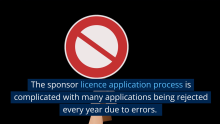Your first decision will be to decide whether to rent or to buy, and whether that will be a house, an apartment or a condominium. Many new immigrants decide to rent at first, in order to save up money to buy and also to get a feel for where they want to live. Please also visit our guide on how to buy a home.
How much can you afford to pay?
Before you select an apartment to rent, you should first think about how much money you can afford to spend on rent.
- Calculate your total monthly household net income after taxes, including your spouse's income if you're married, and any child-support or alimony payments.
- Multiply your total monthly net income by .30. This number will give you a general idea of the amount of rent you can afford to pay.
- Add up all of your other monthly expenses, such as car and credit card payments. Include estimates for food, entertainment and transportation.
- Add together the rent amount from step 2 and the amount from step 3. Make sure this total does not exceed your monthly income. If it does, adjust the amount of rent you can afford.
Looking for an apartment
Finding the right apartment for you - in the right price range, with the right amenities, in the right area of town - isn't hard if you know how to manage the process. Here's what to do.
- Figure out how much you can afford. Be sure to include utilities.
- Think about what cities or neighborhoods you'd like to live in. Consider commute time and what you'd like your local neighborhood to offer.
- Write down what features are important to you, such as parking, acceptable pet policies, proximity to public transportation, security, laundry facilities and number of bedrooms and bathrooms.
- Scan the apartment listings in the local newspaper where you want to live; check online services°; look for rental signs in targeted neighborhoods.
- Keep a file of clipped newspaper ads, computer printouts and notes. Go through your file and call for appointments to see your choice. Make note of any additional information you get.
- Sign up with an apartment-finder service if you are new to the area, can't get around, don't have time to go through the classifieds or want fewer choices to consider. They normally charge the landlord, so beware of services that try to charge you a fee.
- Inspect apartments carefully. Drive by the apartment at night also to make sure the area feels safe.
- Fill out an application for the apartment you want. Submit it with a check for the amount you and the landlord agree on to cover a credit check and show good faith.
- Establish a move-in date, sign a contract and arrange to pay any security deposit and rent required.
Signing a lease
A lease is a legal document between the landlord of the property and the renter. Once you've signed it, it is in force, so make certain you have read it and understand it. Here are some things to think about:
- Make sure the lease covers the basic terms of your tenancy including the amount of rent and all payment terms, such as due dates, payment methods, late fees, grace periods and penalties, and the period of time for the lease (such as 1 year, 6 months or month-to-month).
- Check to see if the lease spells out the responsibilities of both the landlord and tenant, such as who pays for utilities, taxes, maintenance and repairs.
- Review the lease for specific policies about pets, subleasing, inspections, parking, running a home business or any restrictions on guests.
- Evaluate the terms about security deposits, such as when the deposit will be returned and the conditions for a full or partial refund as well as the conditions of any nonrefundable deposits.
- Determine if the lease requires advance notice of your intent to vacate the premises or the landlord's intent to enter the premises for safety or maintenance reasons.
- Look for provisions about the conditions and procedures to end or break the lease.
- You might want to even hire an attorney to review the lease and verify that the document meets all state and local rental laws.

















